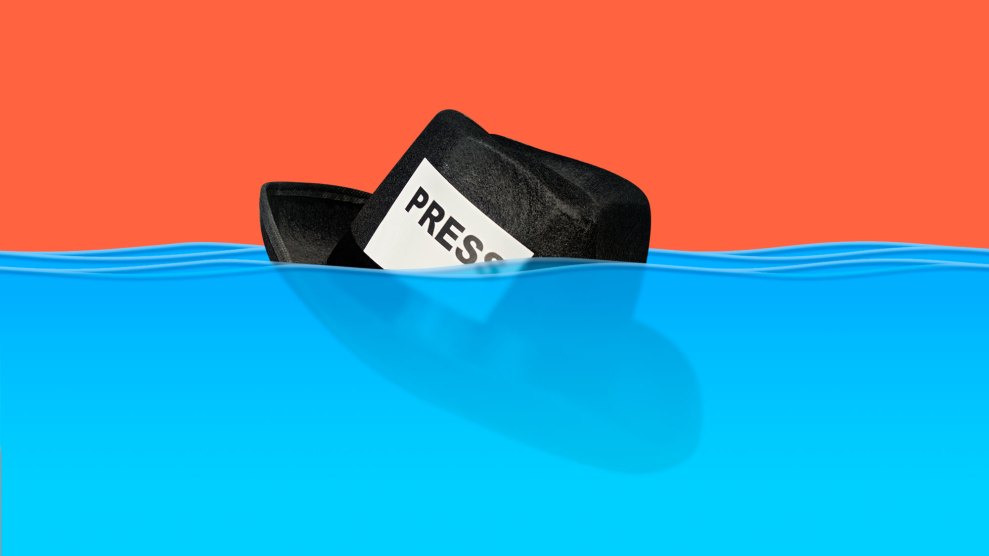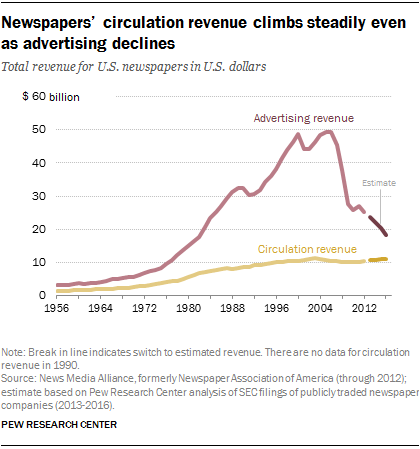
Mother Jones illustration
One of the few bright spots this past year was supposed to be the revival of journalism. And to be sure, it’s been a great time for muckraking, with newsrooms bringing home scoop after scoop on the Trump administration. Subscriptions to everything from the New York Times to Mother Jones are up. And for the first time in decades, trust in news media is rising too: Today, 54 percent of the public have confidence in journalists to tell the truth, while only 36 percent trust the president.
So: Will Donald Trump, perhaps the most anti-journalism president in modern times, actually end up saving journalism?
Here’s where the story turns more complicated. Look at this picture of newspaper circulation nationwide:

No “Trump bump” there. As a regional newspaper editor recently told me, “I showed that graph to our newsroom and said: If that line keeps going, there’s no one left working here in 10 years.” Right after that I watched a presentation on news robots—algorithms that can put together credible stories with stunningly little help from humans. It’s not at all hard to imagine newsrooms populated largely by artificial intelligence a few years hence.
And it’s not just legacy shops that are imploding. Virtually every news organization in America has seen its audience decline (and in some cases crater) since the record numbers of last winter. Some blame the Google and Facebook algorithms (could real news getting caught up in the fight against the fake stuff?). Others speculate that readers and viewers are simply tiring of the 24/7 onslaught of crazy.
Either way, declining audience equals declining advertising revenue, and we know what that means: “Pivot to video,” laying off journalists, the whole desperate search for anything that will keep parent companies or venture capitalists from pulling their cash and finding another cat toy.
Josh Marshall of Talking Points Memo has a good analogy: Digital news sites have been playing musical chairs as they compete for a shrinking amount of ad revenue. Their investors have been betting that any day now, their chosen site will get really, really big (while not needing a lot more staff than when it was small), resulting in advertising revenue at the scale needed to turn a profit. But that’s not happening, and with ads increasingly shifting from publishers to platforms, odds are it never will.
The past few days have brought an onslaught of news in this vein. Buzzfeed, the big media success story of the past decade, projects missing its earnings targets by some 20 percent. CNN faces shortfalls, despite its incredible scoops and a political climate that’s had all of us glued to the headlines. Mashable, another investor darling, announced its sale for about a fifth of its valuation just two years ago. The Daily Beast, owned by the same parent company as Tinder, is looking at a sale, and Univision is on the hunt for someone to take a piece of the former Gawker sites. Alternative weeklies are on life support and Conde Nast is making cuts. Billionaire Republican donor Joe Ricketts shut down the Gothamist network of news sites after the staff voted to unionize. The list goes on.
If this keeps up, Trump’s (and Steve Bannon’s and Kellyanne Conway’s) dream could soon come true: The news landscape will be dominated by cheap, shallow fluff and propaganda of the sort that turns reality-show celebs into presidents. Independent, critical journalism will end up FAILING, not because it’s not doing its job, but because no one will pay to do that job.
If that happens, we journalists will not be blameless. I’ll start with myself: I was trained to ignore not only what the business side was up to (that separation of church and state is healthy and important), but to not think much about the audience either. Once you worried about who was reading or watching, the reasoning went, you would automatically start pandering: Puff pieces, sensationalism, cat videos, blah blah.
It took me a long time to realize how insulting it was to assume that the people you’re trying to reach will inevitably choose crap over substance. But it was an assumption that permeated the industry: You, readers and viewers, were considered by much of our industry to be unwitting dupes needing to be conned into consuming content.
Thus, headlines that promised what stories couldn’t deliver or manipulated your emotions to get you to click “Like.” Webpages slathered with intrusive advertising, or simply ads masquerading as stories. All this was done, in some ways, with good intentions; it’s really hard to make enough money to pay for journalism. But in the end, publishers inched ever closer to squandering the one thing they could not replace: The audience’s trust.
But then Donald Trump came along and did the one thing that could reverse this spiral: He redrew the battle lines. He brutally humiliated reporters (especially women) who covered the campaign. He cheered his surrogates as they insisted on “alternative facts” and cast the press as “the enemy of the people.” He joked with Vladimir Putin, under whose government journalists keep mysteriously dying, about journalists being spies. Like authoritarian figures the world over, the only kind of coverage he tolerated was Hannity-style fawning.
When Trump lashed out at “fake news,” when Steve Bannon called reporters “the enemy of the people,” when a Congressional candidate body-slammed a reporter, they asked Americans to take sides—with them, or with a free, fact-oriented press. And, remarkably, a majority is coming down on the side of journalism.
That’s an extraordinary show of support, given our history of not endearing ourselves to audiences. But now it’s on us to prove that we deserve it. To show that we are not here to manipulate or “monetize” you, but to stand with you, fight with you, for the values of democracy and vigorous debate and pluralism that we all felt down to our core on Election Day. It’s time to earn your trust, not rent it out to the highest bidder.
And when we do that, we may end up earning your support, too. That’s certainly been true here at MoJo. Even back at our founding, back in 1976, it was pretty clear that the booze, tobacco, and car industries (then the mainstays of magazine revenue) would not support exposes on things like exploding Ford Pintos. And it’s even clearer now, when advertisers pay mere pennies per bushel of eyeballs, and demand compliance with their corporate agenda to boot.
The days of investigative reporting brought to you by corporate America and venture capitalists are over. We can either leave what’s left of America’s newsrooms to the robots and Rupert Murdochs—or we can take charge of them ourselves.
At Mother Jones, we’ve made our bet: We don’t have owners or investors besides you, our readers. We work for you and we’re accountable to you. And right now, we look to you to keep us strong at a time when speaking truth to power matters more than ever. So as you start making your end-of-year charitable giving decisions, I hope you’ll consider joining (or re-joining) the community of some 50,000 MoJo donors with a tax-deductible gift here. And you can search for other independent, nonprofit newsrooms, many of them in communities being left behind by for-profit media companies, and help them here.
Trump won’t save journalism. But you—and your support for the news you trust, wherever you find it—can.
Image credit: Rich Legg/Getty
















